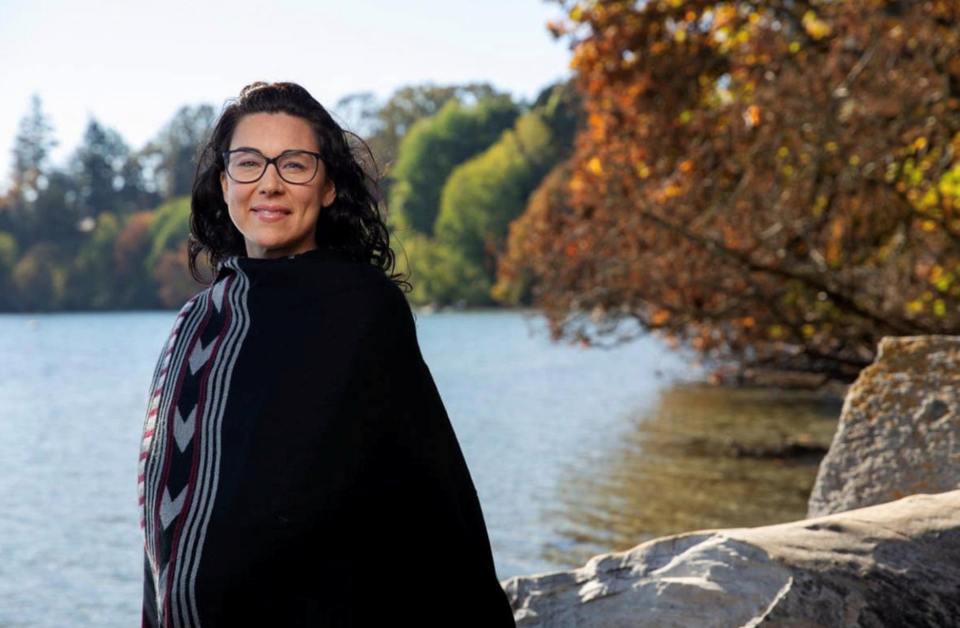Revitalizing Indigenous languages in Canada is everyone’s responsibility says a nƒìhinawƒìwin language learner and language warrior who has a mission to stop the erasure of such.
Onowa McIvor is maskēkow-ininiw (Swampy Cree) and Scottish-Canadian from Kinosao Sipi (Norway House Cree Nation), and has for many years, worked in the field of Indigenous language revitalization at the University of Victoria (UVic). She completed her PhD in Languages and Literacy Education.
Based out of SENƒÜO≈¶EN and l…ôkÃì ∑…ô≈ã…ôn speaking territories, Onowa is part of a group of language activists, practitioners and scholars, who are working to restore First Nation’s languages across Canada.
She leads the national NEȾOLṈEW̱ (One Mind, One People) Research Partnership, which has brought together nine communities in cross-country consultation. This national partnership is Indigenous-led, and Indigenous governed.
Onowa spoke with Indigiþ£ƒÃ…Á«¯ on May 11, just a day ahead of her public lecture on the need for this work and the beauty of Indigenous language, on May 12, for the Big Thinking lecture series, hosted virtually by the Federation for Humanities and Social Sciences.
She is conscious of the fact that this project only exists as a result of colonialism.
“Our field only exists because of the history of this country, of the intentional, historic, violent erasure of Indigenous languages,” she said during the conference.
Benefiting everyone
The project is in its sixth of seven years, nearing completion. Currently, partner communities around the country are wrapping up their research, and pulling together to learn from each other and share. Onowa says it’s a very exciting time.
“The hope is that what we learn from this project will positively affect the whole field of language revitalization. And that many, many communities will benefit from the increase in the learning and the efforts of this collection of people,” Onowa told Indigiþ£ƒÃ…Á«¯.
“In the case of this kind of research, we are intending to benefit, specifically other Indigenous communities who are actively pursuing or aspiring to revive or continue their languages.”
Using an approach that engages with and studies how adults learners both learn, and contribute, the project group has been working to document how they can harness the potential that adults have, to contribute to the revival of Indigenous language.
By the end of the project, Onowa hopes to have created a resource which will help others learn about, and more easily contribute to the revival of Indigenous languages.
It takes a community
Onowa believes it takes a community to restore a language. By that, she means that any language revitalization, reclamation, activities, exercises, or endeavors are necessarily holistic. This journey towards restoring a language starts, she explained, in the womb, and carries on after people are gone.
“It’s automatically intergenerational and inter-connected to other things that are happening in the community,” she said.
Onowa has found over the years that non-Indigenous people react in a few different ways when approached with the idea of Indigenous language revitalization. They’re often either uninformed and think it’s not their issue to deal with, or they’re interested but don’t know what to do.
She said neither of those help them as Indigenous people.
“If you are Canadian, then Indigenous languages are your heritage too. And their continuation should matter to you also,” said Onowa, quoting Dr. Wanosts’a7 Lorna Williams, an emerita professor with UVic who has also worked on the restoration of Indigenous languages.
“The demise and disappearance of Indigenous languages is a scar on the face of Canada, and everybody should be concerned and feel embarrassed about the violent erasure. It was an intentional violent erasure,” Onowa said.
The role of non-Indigenous people in language restoration
When asked about the role of non-Indigenous people in restoring Indigenous language in Canada, Onowa pointed to something she recalled the Dalai Lama expressed about civic responsibilities — that there are civic responsibilities with having citizenship.
Hearing him say this, changed Onowa, and made her question how many Canadians really think about the responsibilities they have. And this question, Onowa says, shouldn’t always be put on Indigenous people to answer for non-Indigenous people. She said people need to educate themselves about their responsibilities, and how they relate to the future of this country.
For example, she posed the question: Would you be able to answer if someone greeted you in the traditional language of the territory where you live?
“We all have a responsibility towards the return and continuation of Indigenous languages in this country, everybody, but not just Indigenous people,” she said.
Onowa has created a guide, with tips (and video) for individuals to get involved.




